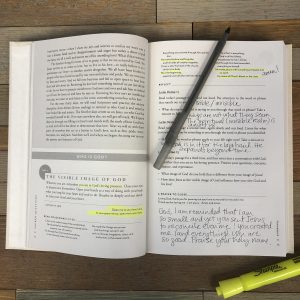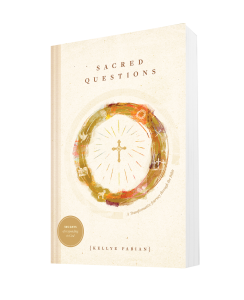One year when my daughter was in middle school, I had the unusual opportunity to pick her up from school every day. I worked downtown and we lived in the suburbs, so this was a short-lived and precious season. Each day, I got in the very long car line with the other parents picking up their kids and put the car in park, and an overwhelming sense of anticipation overtook me. When the bell rang at 2:41 p.m., kids poured out of the doors. Some came out in groups, pushing and laughing. Some walked out alone and made their way to the buses and cars or the path home. Still others came out in pairs, having seemingly deep conversations with each other.
My girl was always one of the last to exit the building. But when she did, it took all I had in me not to roll down the window and yell, “There’s mine! There’s my girl! Here I am, honey!” (I didn’t do that, of course, but just know that it was a strong temptation.) I’d see her huge pink backpack, nearly bigger than her whole body, and her slight smile of recognition when she saw me. She’d heft her heavy bag onto the car floor and slide into the seat.
Unshakable
There wasn’t one day in this year that I didn’t feel overcome by love for her during these pickup times. I wanted to know everything about her day: who said what to whom at lunch, what made her laugh, what her teacher said about this or that, how gym class went. And I wanted to hear about when she felt sad or lonely or if her feelings got hurt or whether she was disappointed about the score she got on a test. I wanted to know and hear and see all of it. My first instinct—no matter her day—was to reach out to her and hug her and provide reassurance. I loved her no matter what. Nothing could make me not love her, not want to reach out and comfort her, or not want what was best for her. Nothing in me wanted to withhold or punish or yell. My love for her was (and is) unshakable.
Nothing has helped me understand more about God’s love—and allowed me to surrender to and trust in that love—than that one year picking my daughter up from school. What I realized halfway through was that as sure as my love for my daughter was, God’s for me (and her) had to be infinitely more. And if that was true, couldn’t I trust that I had nothing to fear by surrendering more and more of my life to God? After all, if I, in all my humanness (subject to fear, exhaustion, distraction, selfishness, and impatience), could so thoroughly and joyfully and unconditionally love my daughter, how much more must the creator and sustainer of all things thoroughly, joyfully, and unconditionally love me? What if the way I wanted to know every single detail about my daughter’s day and heart is a window into God’s stance toward me? And what if his first inclination toward me—his instinctive move—when I share my joys and worries or confess my worst sins is not a distant head nod or a shaking of his finger with disappointment and anger but rather a desire to pull me near, say all is well, and assure me of his unending love? What if that was true?

The hardest thing for most of us to grasp is that we are loved so thoroughly by God. We have read through Jesus’ invitations to us to come to him and abide in him, but to live in his love—to really believe it so that our status as beloved can be seen in every aspect of our lives—is another matter altogether. So much gets in the way. We all have been broken by people who have loved us (or tried to love us) and by our own sinfulness and pride. We are overcome by fear and worry. And we fall into busyness and fail to open space to hear from the God who loves us. Receiving his love isn’t something most of us can just decide to do. We’ve been loved too imperfectly. So we have to present ourselves to God over and over and ask him to remind us that he loves us and fill our minds and hearts with what’s true about how he sees us. To know his love isn’t an intellectual exercise; we must sit and listen to his voice, surrendering ourselves to his love.
Consider what it means to surrender your life to God. Download the free discussion guide for a thirty-day quest into the Scriptures, which follows one of the fourteen sections in the 365-day lectio divina (divine reading), Sacred Questions. If you’re ready for more, purchase the beautiful, 365-day devotional which opens with a heartfelt prayer, contains a Scripture passage for each day, and leads you to questions to bring before God.


